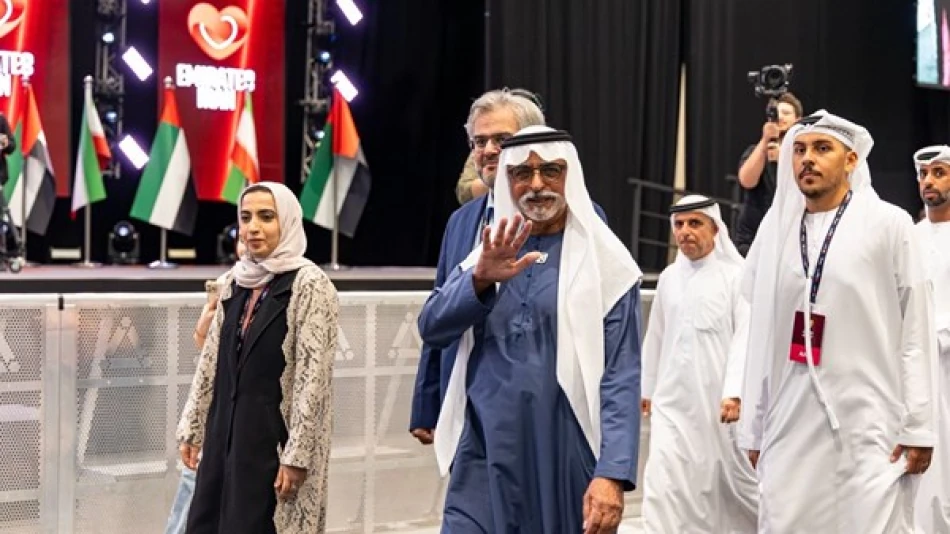
UAE Celebrates Iranian Expatriate Community with Nuhyan bin Mubarak's Attendance
UAE Deepens Cultural Diplomacy with Iran Through Community Celebration
The UAE has reinforced its soft-power approach to regional relations by hosting a major celebration for its Iranian community at Dubai Exhibition Centre, signaling continued commitment to cultural bridge-building despite broader Middle Eastern tensions. The event, attended by high-ranking officials including Minister of Tolerance Sheikh Nahyan bin Mubarak Al Nahyan, demonstrates how the Emirates leverages its diverse expatriate population as diplomatic capital while strengthening economic ties with neighboring Iran.
Strategic Timing Amid Regional Complexities
The celebration comes at a time when UAE-Iran relations occupy a delicate balance in regional geopolitics. While the UAE maintains strong security partnerships with Western allies, it has simultaneously pursued pragmatic economic engagement with Iran, positioning itself as a neutral hub for regional commerce. This cultural event reinforces that approach, showcasing the UAE's ability to compartmentalize political tensions from business and cultural relationships.
The presence of Iran's Consul General Ali Reza Mahmoudi alongside Emirati leadership sends a clear message about the UAE's commitment to maintaining dialogue channels. This mirrors Singapore's approach to regional diplomacy, where cultural celebrations serve as diplomatic tools to maintain relationships across political divides.
Economic Underpinnings of Cultural Diplomacy
Beyond the cultural festivities, the event highlights the substantial economic stakes involved. The UAE-Iran Business Council, established in 2014, has facilitated trade partnerships across sectors including energy, tourism, and agriculture. Iranian businesses have historically used Dubai as a regional hub, contributing significantly to the emirate's status as a Middle Eastern commercial center.
Trade volumes between the two countries have remained resilient despite international sanctions, with Dubai's traditional role as a re-export hub making it crucial for Iranian access to global markets. The celebration effectively reinforces these economic ties by emphasizing the Iranian community's contributions to UAE development.
Soft Power Strategy in Action
Minister Sheikh Nahyan's announcement of the "Our Life in the UAE" drawing competition represents a sophisticated soft-power initiative. By inviting Iranian residents to document their experiences through art, the UAE creates lasting cultural artifacts that demonstrate successful integration while building goodwill.
This approach parallels successful cultural diplomacy programs in countries like Canada and Australia, where immigrant communities become ambassadors for their host nations. The UAE's "Year of Community" framework provides institutional support for such initiatives, making them part of broader national strategy rather than isolated events.
Leveraging Expo Infrastructure
The choice of Dubai Exhibition Centre at Expo City Dubai as the venue carries symbolic weight. The site represents the UAE's global ambitions and its success in hosting international events. Using this prestigious location for an Iranian community celebration elevates the event's significance and demonstrates the UAE's commitment to showcasing its multicultural character.
Regional Implications and Future Outlook
The celebration occurs against the backdrop of evolving Middle Eastern dynamics, where traditional alliances are being reassessed. The UAE's approach of maintaining cultural and economic ties with Iran while strengthening security partnerships elsewhere reflects a pragmatic foreign policy that prioritizes economic interests and regional stability.
This strategy positions the UAE as an indispensable mediator in regional affairs, potentially valuable for future diplomatic initiatives. The Iranian community's integration success story also serves as a model for the UAE's broader vision of becoming a global hub for diverse populations.
For investors and businesses, the event signals continued UAE commitment to maintaining its role as a regional commercial bridge, regardless of political tensions. This stability makes the Emirates attractive for companies seeking Middle Eastern exposure while managing geopolitical risks through diversified regional relationships.
Most Viewed News

 Layla Al Mansoori
Layla Al Mansoori






